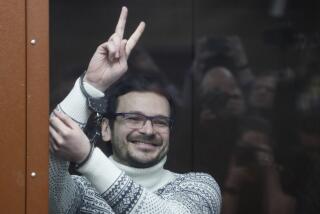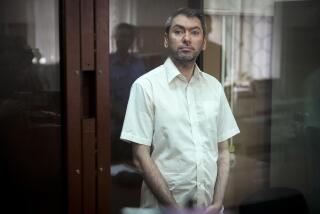Yeltsin, Polishing His Image, Pays Tribute to Late Dissident
- Share via
MOSCOW — Battling to remove the tarnish from his reputation as a democrat, President Boris N. Yeltsin paid respects Tuesday to the memory of dissident Andrei D. Sakharov on what would have been his 75th birthday, and restored a state commission dedicated to the defense of human rights.
The moves were clearly aimed at winning back support from democratic reformers who have defected from the Yeltsin camp since he launched the brutal war in Chechnya 17 months ago and because of the epidemic of corruption in his administration.
But for those who hold the memory of Sakharov in deep respect, the troubled incumbent’s solicitation could backfire.
Although Yeltsin can probably count on the support of most human rights activists in his fight for the presidency against Communist Party leader Gennady A. Zyuganov, some may find his grandstanding on the grave of Sakharov a sacrilege.
“Sakharov was the first teacher in democracy for me and for the whole of Russia,” Yeltsin told reporters after laying flowers at the grave of the late human rights fighter in the Vostryakovo cemetery.
He later met with Sakharov’s fellow scientist and dissident Yuri Orlov--a meeting his publicists trumpeted as evidence of democratic support for the incumbent.
Sergei A. Kovalev, a longtime friend of Sakharov’s until the latter’s death in 1989, quit as Yeltsin’s human rights commissioner in January to protest the president’s deadly pursuit of rebels in Chechnya and his seeming indifference to the lives and security of the separatist republic’s civilians.
While Kovalev has distanced himself from Yeltsin and denounced the president as a deserter of democratic values, the campaigning incumbent apparently succeeded in enlisting the support of Orlov.
The Presidential Press Service reported that Yeltsin received Orlov in the Kremlin and that the visiting emigre, who now lives in the United States, voiced his support for the president’s reelection.
Orlov was at Sakharov’s side for the 1976 founding of the Moscow Helsinki Group, which campaigned during the repressive Soviet era for personal freedoms and on behalf of people persecuted for views contrary to those of the ruling Communists.
Yeltsin assured Orlov that defense of human rights will always be a priority, the partisan news service reported after the meeting.
It was also announced in the report that Yeltsin has replaced Kovalev with 62-year-old judge Vladimir Kartashkin as head of the revived Presidential Commission on Human Rights.
Orlov, a physicist who was jailed and later deported by Soviet authorities for anti-state activities, was in Russia for a conference of human rights organizations.
He told the NTV independent television network that he had urged Yeltsin to settle the conflict in Chechnya, where as many as 30,000 people have been killed, mostly civilians.
More to Read
Sign up for Essential California
The most important California stories and recommendations in your inbox every morning.
You may occasionally receive promotional content from the Los Angeles Times.














